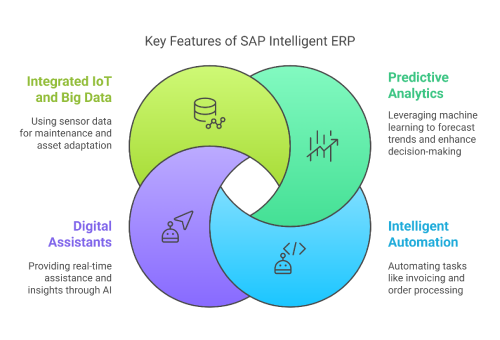

Intelligent ERP uses AI and ML to automate mundane tasks, analyze large amounts of data, and provide actionable information. Consequently, it has enabled organizations to optimize operations across various functions, including finance, supply chains, and human resources (1). The global ERP market is estimated to attain an annual value of $44 billion, indicating that organizations are increasingly dependent on these systems for the execution of business management(1).
Modern-day ERP systems are now turning business operations by integrating smart technologies such as predictive analytics, machine learning, and AI-powered chatbots into increasingly complex data-crunching, natural language understanding, repetitive task automation, and even picture recognition, that is, simply putting into one seamless intelligent workflow highly complex business processes.
Predictive maintenance is the most influential domain, where AI and ML bring about significant value. AI algorithms are capable of evaluating historical datasets of equipment performance and predicting potential failure events ahead of time. This proactive attitude favors maintenance scheduling ahead of failures, thus minimizing downtime and reducing maintenance expenses. For example, SAP Predictive Maintenance and Service is a solution that utilizes machine learning to analyze sensor data from industrial equipment and recognizes patterns that indicate the likelihood of failure, enabling resources to schedule maintenance precedence, thus avoiding costly unplanned downtime (SAP, 2023).
Another important area in which AI and ML are applied in SAP is intelligent forecasting. With the capacity to connect numerous databases, such as historical and current sales data, market trends, and external factors, into one set of intelligent forecasting numbers, AI algorithms can provide better forecasting. With improved forecasting accuracy, firms can balance inventory, enhance production planning, and manage resource-allocation decisions more effectively. AI forecasting capabilities are available in SAP’s Integrated Business Planning solutions to help businesses prepare for demand variations and tailor their supply chain strategies accordingly (SAP 2023).
Additionally, numerous other business processes facilitated by automation are driven by AI and ML in SAP. AI-related robotic process automation can handle repetitive tasks such as data entry and invoice processing, allowing employees to focus on strategic endeavors. AI-based chatbots and virtual assistants can offer real-time help to users and promptly address their questions or concerns. SAP’s Intelligent Robotic Process Automation employs AI to further automate complicated business operations, elevate efficiency, and reduce operational costs (SAP 2023).
With the latest innovations, entities within intelligent ERP systems are becoming more capable. This technology can automatically generate detailed reports from raw data, draft personalized communications, and even generate marketing material with reference to preset parameters (1, 2). For instance, in 2023, SAP introduced the generative AI assistant “Joulie,” which demonstrated the application of generative AI technologies in ERP solutions to refine operational efficiency (1).
The ongoing evolution of intelligent ERP signifies that businesses in the years to come will find themselves operating with unprecedented agility and insight. SAP’s commitment of SAPs to embedding AI across platforms is seen in initiatives such as RISE with SAP, covering the modernization of business processes through cloud solutions with embedded AI capabilities that augment daily business operations (3).
Graphical representation of the impact of AI on ERP systems can be illustrated as follows:
| # | Impact Area | Traditional ERP | Intelligent ERP with AI |
|---|---|---|---|
| 1 | Decision-Making Speed | Slower | Real-time |
| 2 | Task Automation | Limited | Extensive |
| 3 | Predictive Capabilities | Minimal | Advanced |
| 4 | Customer Personalization | Generic | Tailored |
| 5 | Operational Costs | Higher | Lower |
This table highlights the transformative effects that intelligent ERPs bring compared to traditional systems.
Thus, the use of AI and ML in integration with SAP solutions is revolutionizing business operations. Therefore, applying these technologies, companies can derive significant value from their data, enhance the efficiency of their operations and enhance their performance. Thus, the development of AI and ML technologies is likely to be followed by new and unexpected applications of these technologies within the SAP ecosystem.

Artificial intelligence (AI) and machine learning (ML) are changing the way of Enterprise Resource Planning (ERP) systems and SAP, one of the biggest ERP providers has embraced this shift. This is an account of some real life implementations of companies that are using intelligent ERP solutions with the help of SAP’s AI and ML capabilities below:
Authored by
subrat.swain@oasystspl.com